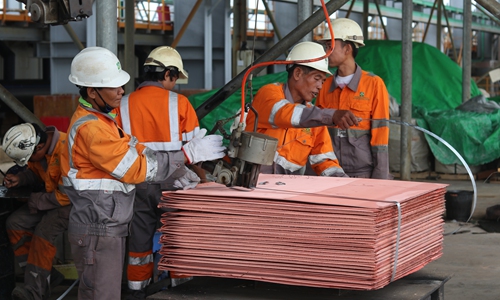
Employees work in the Letpadaung Cooper Mine. Photos: Courtesy of Wanbao
A three-hour's drive from Myanmar's second largest city Mandalay sits the Letpadaung Copper Mine, spanning about 40,000 hectares in Monywa.With an investment of $1.1 billion, the mine is Asia's largest hydrometallurgy project, jointly developed by Chinese firm WanBao Mining and two Myanmar companies.
Last year, the project's cathode copper mine output hit a record high of 120,000 tons, up 20,000 tons from production output in 2018, Zhang Yupeng, managing director of Myanmar Wanbao Mining Copper, told the Global Times over the weekend.
With the mining project in full swing and its workers busily devoting themselves to the effort, it is hard to imagine the project had once been a source of controversy among some Monywa villagers around 2013.
During that period, villagers protested over claimed environmental impacts and land confiscation allegations incited by anti-China forces and Western non-government organizations. The unrest led to suspension of the mine's construction.
But the project resumed in 2015, after many residents grasped beneficial aspects of the China-Myanmar Economic Corridor (CMEC). Many regarded investment from Chinese companies as an opportunity to enhance their livelihoods and provide a much-needed upshot to the nation's economy.
After running for several years, the mine has provided more than 5,000 direct and indirect job opportunities to residents, according to Zhang, with an average earning several times Myanmar's average monthly salary of $100.
The Chinese company also helped build a chicken farm housing 100,000 laying hens for the community, becoming a driver of economic growth for Monywa's agriculturally based economy.
"This is what we called win-win cooperation under the Belt and Road Initiative (BRI). While China has a massive market for copper mine resource, Chinese firms' expertise in mining also help Myanmar to bring down the cost to an internationally competitive level and nurture more local talents," Zhang said.
In addition, Wanbao has been contributing $4 million every year to help neighboring villages improve infrastructure, build schools and issue pensions, according to Zhang. The social responsibility scheme will last for 30 years.

A general view of the Letpadaung Copper Mine project Photo: Courtesy of Wanbao
More win-win investmentThe Letpadaung Copper Mine project is just one example of the ups and downs Chinese firms encountered in the Southeast Asian country.
It is also a vivid display of the partnership between China and Myanmar, which has warmed since Myanmar distanced itself from the West over the latter's double-standard approach on human rights issues and turned to China for political and economic support.
Chinese President Xi Jinping paid a state visit to Myanmar from Friday to Saturday, marking Xi's first foreign visit of year 2020. It is also the first state visit to Myanmar by a Chinese president in 19 years.
During Xi's two-day visit, companies from both China and Myanmar signed a number of agreements in sectors including politics, trade and investment, people-to-people exchanges and regional cooperation, the Xinhua News Agency reported.
Pe Myint, Union Minister of the Ministry of Information, described the closer China-Myanmar cooperation as "mutually beneficial and win-win" based on the concept of mutual trust and mutual respect.
A joint statement issued by China and Myanmar on Saturday said both countries have agreed to unleash the role of the Kyaukphyu port in promoting the building of the CMEC, which also includes a special economic zone on the border and a new city project in Yangon.
Kyaukphyu Special Economic Zone is one of the three economic zones set up by Myanmar government to develop its economy.
Chang Zhenming, chairman of CITIC, the Chinese company which leads a consortium in developing the Kyaukphyu port project, told the Global Times that it aims to build the deep-sea port into one of the largest and most efficient container ports in Asia to serve as a gateway for Myanmar and Association of Southeast Asian Nations (ASEAN) countries to India, Africa and the Middle East.
"It will improve the basic infrastructure of Myanmar and reduce logistics cost," said Chang. He also estimated that the project will bring $15 billion in tax revenue to the Myanmar government during the concession period and provide 100,000 jobs every year.
It will also save about one week of transportation time if products are shipped from the Kyaukphyu port to Central China compared with that of ports in Southeast China, while also opening markets in Southwest Chinese provinces, Chang noted.
Controversies
Despite closer ties, some industry insiders could still recall the incident involving the Myitsone Dam project, which they said sent a stern warning to those Chinese companies planning to expand in Myanmar.
The 7.3-billion-yuan large dam and hydroelectric power development project in Kachin state has been put on hold since 2011, following massive protests driven predominately by political aims and incitement from Western forces.
"Electricity cooperation between China and Myanmar hangs in limbo since then… Few Chinese firms are wiling to take the risk to build hydropower station despite the country having an extreme shortage of electricity," an executive of a state-owned electricity investment company, told the Global Times on the condition of anonymity.
Pe Myint told the Global Times it is inevitable that different voices exist during Myanmar's democratization process. He suggested that Chinese and Myanmar companies build an effective communication channel to increase trust and avoid misunderstanding.
Some Chinese companies also showed concerns on the slow administrative process, which they said weighed on their future investment plans in Myanmar.
"We're concerned about the instability of policies such as those concerning foreign investment and tax. And the process of government approval is also lengthy," Li Zilin, spokesperson of the China-Myanmar Crude Oil&Gas Pipeline, told the Global Times.

